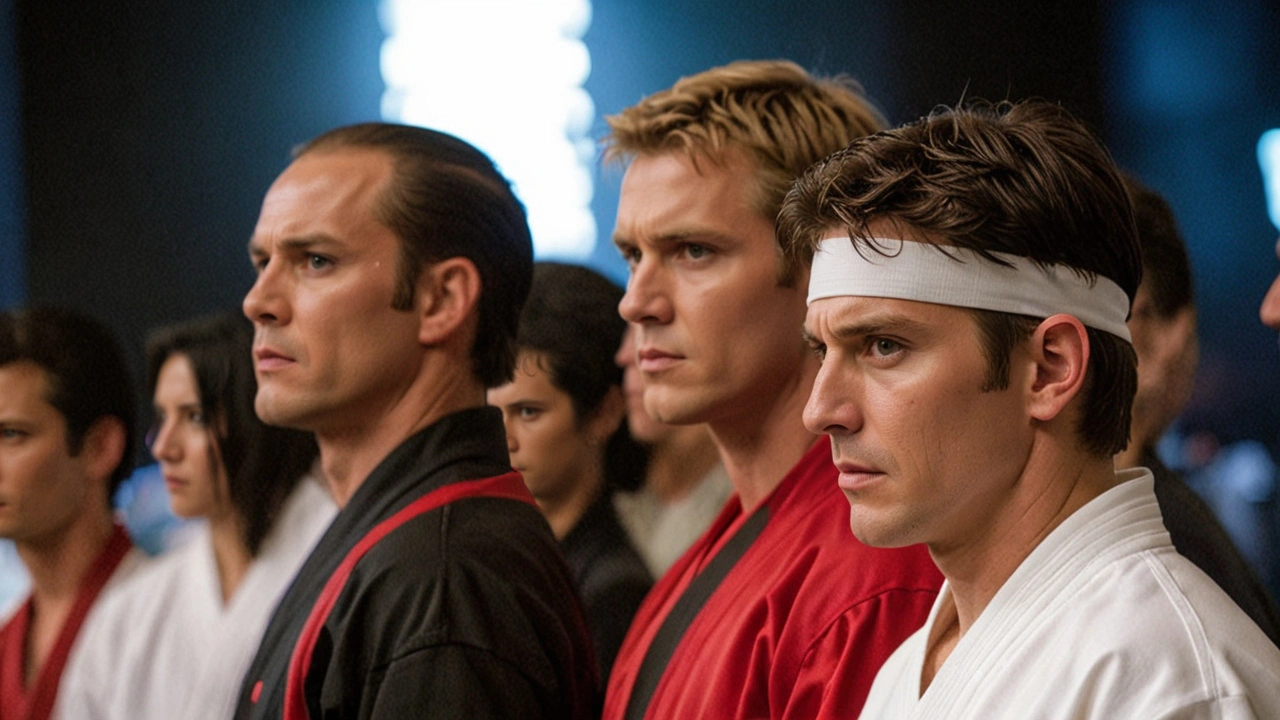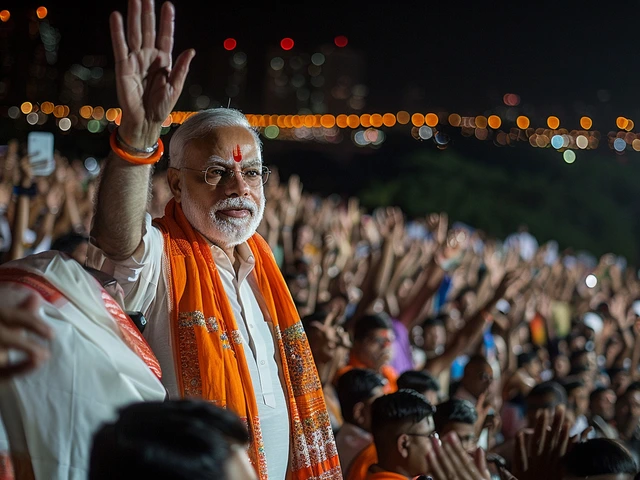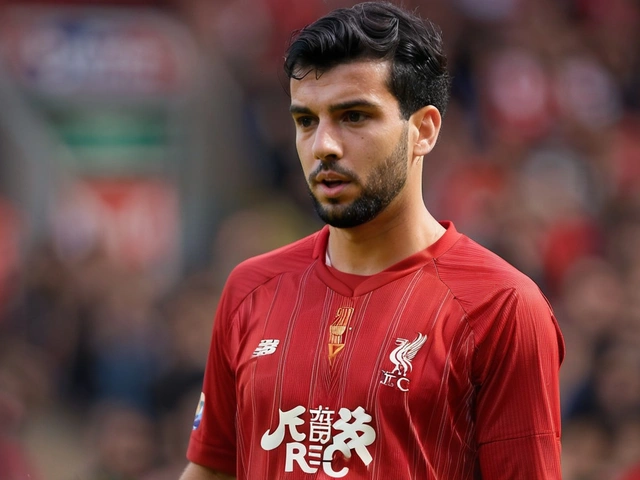The Evolution of 'Cobra Kai'
Since its inception, 'Cobra Kai' has reinvigorated interest in the classic 'Karate Kid' franchise, captivating a global audience with its compelling characters and dramatic storylines. The series, originally launched as a low-budget project on YouTube Premium, later found an even larger audience after being picked up by Netflix. Its unique blend of nostalgic callbacks and fresh narratives kept fans hooked, and now, with the sixth and final season on the horizon, excitement is at an all-time high.
The anticipation for the final season of 'Cobra Kai' has come with a unique twist: the decision to split the season into three distinct parts. Each of these parts consists of five episodes, with Part 1 having premiered on July 18, 2024. Parts 2 and 3 are scheduled to follow, with Part 2 dropping on November 15, 2024, and Part 3 expected sometime in 2025. These choices aren't arbitrary but rather, a calculated move to ensure that the narrative arc remains engaging and digestible for the audience.
Reasons Behind the Unique Release Strategy
One could ask why the creators chose to release the final season in this segmented manner. The answer lies primarily in the desire to avoid overwhelming viewers. Releasing all 15 episodes at once, while potentially binge-worthy, could lead to viewer fatigue. By staggering the episodes, the creators provide an opportunity for the audience to absorb and enjoy the intricate storylines without feeling inundated.
This planning is especially prudent considering the narrative complexity that has come to define 'Cobra Kai.' The show's ability to interweave multiple subplots, from high-stakes karate tournaments to deeply personal character development arcs, requires a pacing that doesn't dilute the impact of any single episode. The split also allows fans to speculate and discuss each segment, thereby maintaining a sustained buzz around the series over a longer period. In many ways, this strategy mirrors successful templates used by other popular Netflix shows like 'Stranger Things' and 'Bridgerton.'
Creative Vision and Execution
According to Hayden Schlossberg, one of the key creators of the show, the decision for a 15-episode final season was never in question. The team wanted to ensure that all characters and plot points received their due closure. However, the logistics of releasing such an extensive season required a more innovative approach. Splitting the season into three parts provided the perfect solution. Schlossberg mentioned that the idea was to offer each part as a mini-season, each with its own beginning, middle, and end, but all tied together by an overarching narrative.
This structure isn't just a random decision but a deliberate choice designed to mirror the segmented storytelling often found in traditional martial arts films—where multiple training sequences and battles lead up to an ultimate showdown. The gradual build-up ensures that the climax is not rushed, thereby giving fans the intense, high-stakes drama they have come to love.
Navigating Viewer Expectations
The landscape of television has dramatically changed, especially with the advent of streaming platforms. In the era of binge-watching, viewer habits lean towards consuming entire seasons in quick succession. However, this isn't without its drawbacks. The temptation to race through episodes can sometimes result in overshadowing important character developments and plot intricacies. By spacing out the final season's release, 'Cobra Kai' creators ensure that each moment receives the attention it deserves.
This phased release also gives the production team time to gauge audience reactions and perhaps refine subsequent parts if needed. Fan theories and discussions can influence minor tweaks, providing a more interactive experience between creators and the fan base. In essence, this approach turns the season finale into an event spread over months, transforming each release into a mini-celebration among fans.
Maintaining Momentum and Interest
Breaking the final season into three parts helps sustain interest over a longer period. With each new drop of episodes, there's renewed media coverage, social media buzz, and general excitement among fans. This cycle of anticipation and delivery keeps the series relevant in an increasingly crowded entertainment market. It offers the cast and crew several opportunities to engage with fans and the media, heightening visibility and keeping 'Cobra Kai' in the public eye.
The spaced-out schedule also aligns with major holidays and key viewing periods. By releasing Part 2 in November, the show capitalizes on the holiday season when viewers are more likely to have downtime to watch their favorite series. This careful timing ensures that 'Cobra Kai' remains part of the cultural conversation, drawing in both long-time fans and potentially new viewers who hear the buzz.
Fan Reactions to the Split Season
Fan responses to this unconventional release strategy have been mixed but predominantly positive. Initial apprehensions about waiting for the concluding parts were quickly overshadowed by the recognition of the benefits this approach offers. Enthusiasts appreciate the chance to fully digest and discuss each section before moving on to the next. In many ways, it has turned the viewing experience into an extended communal event, where fans can share theories, hopes, and speculations about how the series will ultimately conclude.
Indeed, this phased release has provided ample fodder for fan sites, podcasts, and social media discussions. Each segment release turns into a mini-event that reignites interest and conversation. With every part, there's renewed analysis and excitement, further solidifying the show's place in pop culture.
Conclusion: A Thoughtful Ending
The final season of 'Cobra Kai' is more than just the end of a beloved series; it's a masterclass in thoughtful storytelling and audience engagement. By splitting the season into three parts, the creators ensure that fans receive a satisfying, meaningful conclusion without feeling overwhelmed. This structured approach respects the show's narrative complexity and the audience's ability to savor each moment.
As we await the release of Parts 2 and 3, it's clear that 'Cobra Kai' will leave a lasting legacy not only for its riveting storylines but also for its innovative approach to storytelling in the digital age. In doing so, it demonstrates that sometimes, less is more, and drawing out the anticipation can make the payoff even sweeter.








6 Comments
Wow, what a brilliant way to keep the hype alive! Splitting the final season into bite‑size arcs lets us savor every showdown 😄. It feels like the creators are giving us a gift, a little treat every few months. Plus, the extra buzz means we all get to geek out together longer. Can't wait for Part 2! 😊
The strategic segmentation of the sixth installment of Cobra Kai exemplifies a paradigmatic shift in content delivery architectures within the OTT ecosystem. By fragmenting the fifteen‑episode corpus into three discrete modules, the producers are effectively mitigating the risk of audience attrition that is often observed in contiguous binge‑release models. This approach aligns with the principles of cognitive load theory, wherein the temporal spacing of narrative stimuli facilitates deeper encoding and retrieval of plot intricacies. Moreover, the incremental release cadence generates a sustained neurochemical reward loop, leveraging the dopamine surge associated with episodic cliffhangers and speculative discourse. From a data analytics perspective, the staggered deployment enables granular measurement of engagement metrics such as average watch time, retention rates, and sentiment polarity across each micro‑season. These analytics can subsequently inform dynamic content optimization pipelines, allowing the production team to calibrate pacing, character arcs, and even post‑production tweaks in near real‑time. The temporal alignment with key consumption windows-summer streaming for Part 1, holiday viewing for Part 2, and the early‑year sweep for Part 3-maximizes market penetration across disparate demographic cohorts. In addition, the modular structure mirrors the iterative development cycles endemic to agile software methodologies, wherein each sprint yields a minimally viable product increment that can be evaluated and refined. This analogical mapping underscores the convergence of entertainment engineering and software engineering best practices, illuminating the interdisciplinary nature of modern media production. By cultivating a sustained dialogue among fan communities, the release strategy also amplifies organic word‑of‑mouth propagation, a phenomenon that traditional linear broadcast rarely achieves. The resultant echo chamber effect perpetuates brand equity and fortifies the intellectual property’s cultural imprint. From a monetization standpoint, the prolonged attention span translates into extended ad‑supported viewership windows and ancillary merchandise opportunities. Furthermore, the segmented rollout permits strategic cross‑promotion with complementary Netflix titles, thereby constructing a synergistic content lattice. The kinetic narrative pacing inherent to this format also respects the multi‑threaded storytelling ethos that Cobra Kai has cultivated since its inception. Consequently, the audience experiences a calibrated crescendo of tension that culminates in an electro‑charged denouement, rather than an abrupt episodic climax. In sum, the tripartite partitioning of the final season is not merely a logistical convenience but an intentional, data‑driven orchestration designed to optimize both user experience and commercial viability.
While the marketing ploy may boost viewership, we must remember that art should not be reduced to a mere consumption schedule.
Hey there, I totally get the data‑driven angle you laid out – it’s fascinating how the release rhythm works like a heartbeat for the fanbase 😊. At the same time, I think the emotional payoff of waiting for each part keeps the community tight, which is something numbers alone can’t fully capture. Loved the way you broke down the analytics, really makes me appreciate the behind‑the‑scenes effort! 😁
The spaced out chapters feel like training sessions for the soul each release a dojo where we sharpen our anticipation and reflect on the journey
I find the three‑part rollout absolutely brilliant; it not only extends the narrative momentum, but also invites continuous community analysis, which in turn enriches the collective viewing experience; the interplay between release timing and audience engagement metrics is a fascinating case study, and I’m eager to see how future streaming projects might emulate this model; let’s keep discussing the implications for content strategy and fan interaction!